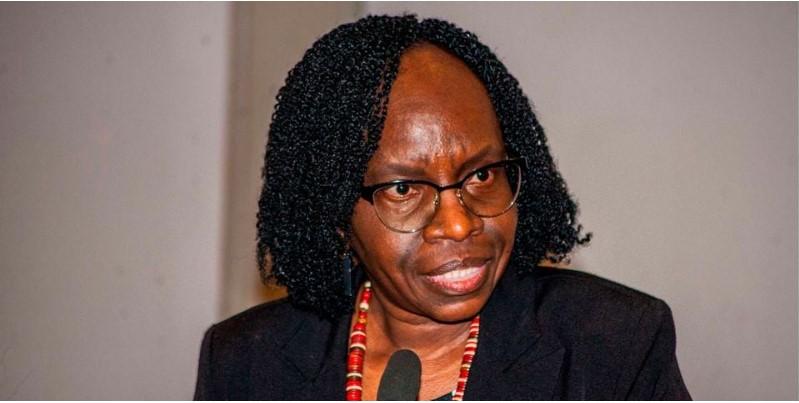Auditor General Flags Withdrawal Of Ksh.147B By Treasury Without Parliamentary Approval
Auditor General Nancy Gathungu has expressed concern about a steady rise in Treasury withdrawals of funds without obtaining prior approval from the National Assembly.
Gathungu states that the unauthorized withdrawals outlined in Article 223 surged from Ksh.1.1 billion in the 2014/2015 fiscal year to Ksh.147.3 billion in the 2022/2023 fiscal year under the current administration. This marks a remarkable 13,000 percent increase over nine years.
Her feelings align with a Special Audit report that revealed five government Ministries, Departments, and Agencies (MDAs) seeking Ksh.5 billion for recurring expenses and an additional Ksh.2.8 billion for developmental purposes.
Even though the Controller of Budget approved these sums, they were not revealed in the information provided to the National Treasury.
“The most astonishing bit is that Ksh.147 billion was withdrawn without approval of Parliament,” Gatundu South MP Gabriel Kagombe said.
Furthermore, six Ministries, Departments, and Agencies (MDAs) expended a sum of Ksh.47.2 billion, surpassing the approved amount allocated by the Treasury as supplementary funding authorized under Article 223 of the Constitution.
The findings in the report also indicated that certain Ministries, Departments, and Agencies (MDAs) have consistently surpassed the 10% limit of the allocated budget since 2014, in violation of Section 43(2) of the Public Finance Management Act of 2012.
Gathungu additionally emphasized shortcomings in the National Treasury’s purchase of stocks in the fiscal year 2022/2023.
Significantly, there is ambiguity regarding the Ksh.6.3 billion worth of shares acquired by the Kenyan government in the Eastern and Southern African Trade and Development Bank, as well as the Africa Export-Import Bank (AFREXIM Bank).
“Our request on Eastern and Southern African Trade Development Bank shareholding has not been responded to date. As a result, we were unable to confirm the purchase of shares and to determine whether any benefits may have accrued to the Government of Kenya,” said the Auditor General.
She also brought attention to the Treasury’s approval of Ksh.7.4 billion for the Fertilizer E-subsidy program in September 2022.
“Although the fertilizer had been distributed to farmers, the program may not have achieved its intended objective as the distribution of the fertilizer was not in time for the planting season,” said Gathungu.
ALSO READ:
- “Two Groups, One Agenda”: Gachagua Accuses Raila of Secret Political Deals
- Exclusive: Ida Odinga’s 75th Birthday Party in Karen (Photos)
- FKF President Discloses Exact Amount Paid to Harambee Stars Players
- Gachagua’s Ally Senator John Methu Admits Ruto Might Win 2027 Elections
- Maraga Explains Why He Hasn’t Campaigned in Kisii Despite 2027 Bid
In emphasizing the earmarking of Ksh.21 billion for the dispersal of relief food spanning the fiscal years 2016 to 2022, the Auditor General raised various issues. These included the absence of thorough guidelines for the process, neglect in preparing and submitting reports on food distribution, insufficient authorization for expenditure at the county level, and incomplete distribution lists.
The audit discrepancies also encompass the Ministry of Health, where more than 500 billion shillings were allocated to 17 healthcare facilities.
Furthermore, there were defective hospital instruments amounting to Ksh.185 million, and equipment valued at Ksh.155 million remained to be installed during the fiscal year 2022/2023.
The examination also investigated the distribution of CT Scans worth Ksh.1.7 billion to healthcare institutions. It was revealed that CT Scan machines in six out of twenty-seven hospitals were found to be outdated.
In the Ministry of Education, there are apprehensions regarding the allocation of Ksh.13.5 billion earmarked for the capitation of Grade 7 students in Junior Secondary Schools for the fiscal year 2022/2023.
The findings in the report reveal that 7,340 students in 187 selected Junior Secondary Schools were not granted this financial support. Additionally, eight schools missed out on the funding, resulting in a lack of access to high-quality education for the students.
Questions during the audit have also arisen concerning the Ksh.2 billion initiative for constructing classrooms under the Competency Based Curriculum (CBC). The concern is related to the allocation of funds intended for the construction of 10,000 classrooms.
In the audit, substandard craftsmanship was identified in 215 schools. Moreover, nine classrooms were unfinished, and an additional 30 classrooms were not actively utilized.
Auditor General Flags Withdrawal Of Ksh.147B By Treasury Without Parliamentary Approval
